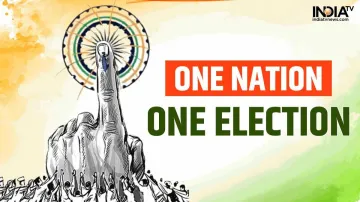One Nation, One Election: In a landmark decision, the Union Cabinet has approved bills to implement the "One Nation, One Election" initiative, marking a significant step towards streamlining the electoral process in the county. The decision is based on recommendations made by a high-level committee led by former President Ram Nath Kovind. The proposal aims to synchronise Lok Sabha, Assembly, urban body, and panchayat elections across the country and conduct them within a 100-day timeframe. This initiative is expected to enhance efficiency, reduce costs, and minimise disruption caused by frequent elections in the country.
The Cabinet's approval follows its earlier nod in September for the "One Nation, One Election" proposal. A comprehensive bill outlining the legal framework and operational details is likely to be introduced soon, paving the way for its implementation. Following the Cabinet's approval, Prime Minister Narendra Modi praised the decision, calling it a significant step towards enhancing India's democracy.
Top 10 recommendations made by Ram Nath Kovind panel
- The government must develop a legally-tenable mechanism in order to restore the cycle of simultaneous elections.
- In the first stage, elections for the Lok Sabha and all state legislative assemblies can be held together.
- In the second step, the elections to municipalities and panchayats will be synchronised with the Lok Sabha and state assemblies in such a way that the polls to municipalities and panchayats are held within 100 days of the holding of the parliamentary and Assembly elections.
- For the purpose of synchronising the Lok Sabha and Assembly elections, the President shall notify the date of the first sitting of the Lok Sabha after a general election as the "appointed date".
- The tenure of all state assemblies formed via polls after the "appointed date" and before the expiry of the full term of the Lok Sabha will only be for the period ending up to the subsequent parliamentary polls. After this one-time transitory measure, all Lok Sabha and Assembly polls will be held simultaneously.
- Fresh elections could be held to constitute a new Lok Sabha in the event of a hung House or a no-confidence motion or any such event.
- Where fresh elections are held for the House of the People (Lok Sabha), the tenure of the House will be "only for the unexpired (remaining) term of the immediately preceding full term of the House".
- When fresh elections are held for state legislative assemblies, then such new assemblies -- unless sooner dissolved -- shall continue up to the end of the full term of the Lok Sabha.
- A single electoral roll and elector's photo identity card (EPIC) shall be prepared by the Election Commission (EC) in consultation with the state election commissions and the same will substitute any other electoral roll prepared by the EC.
- For making logistical arrangements for the conduct of simultaneous elections, the EC may draw up a plan and estimate in advance for the procurement of equipment, such as EVMs and VVPATs, deployment of polling personnel and security forces and make other necessary arrangements.
Is concept of 'One Nation, One Election' new in India?
It should be noted here that 'One Nation, One Election' is not a new concept in India. Following the adoption of the Constitution in 1950, elections for the Lok Sabha and all state assemblies were held simultaneously every five years between 1951 to 1967. The polls were held simultaneously for the Centre and states in 1952, 1957, 1962 and 1967. The process came to an end as new states began to form and some old ones were reorganized. Following the dissolution of various legislative assemblies in 1968–1969, this practice was entirely abandoned.
ALSO READ: 'One Nation, One Election' is not new concept in India: Here's timeline and how it discontinued | EXPLAINED
